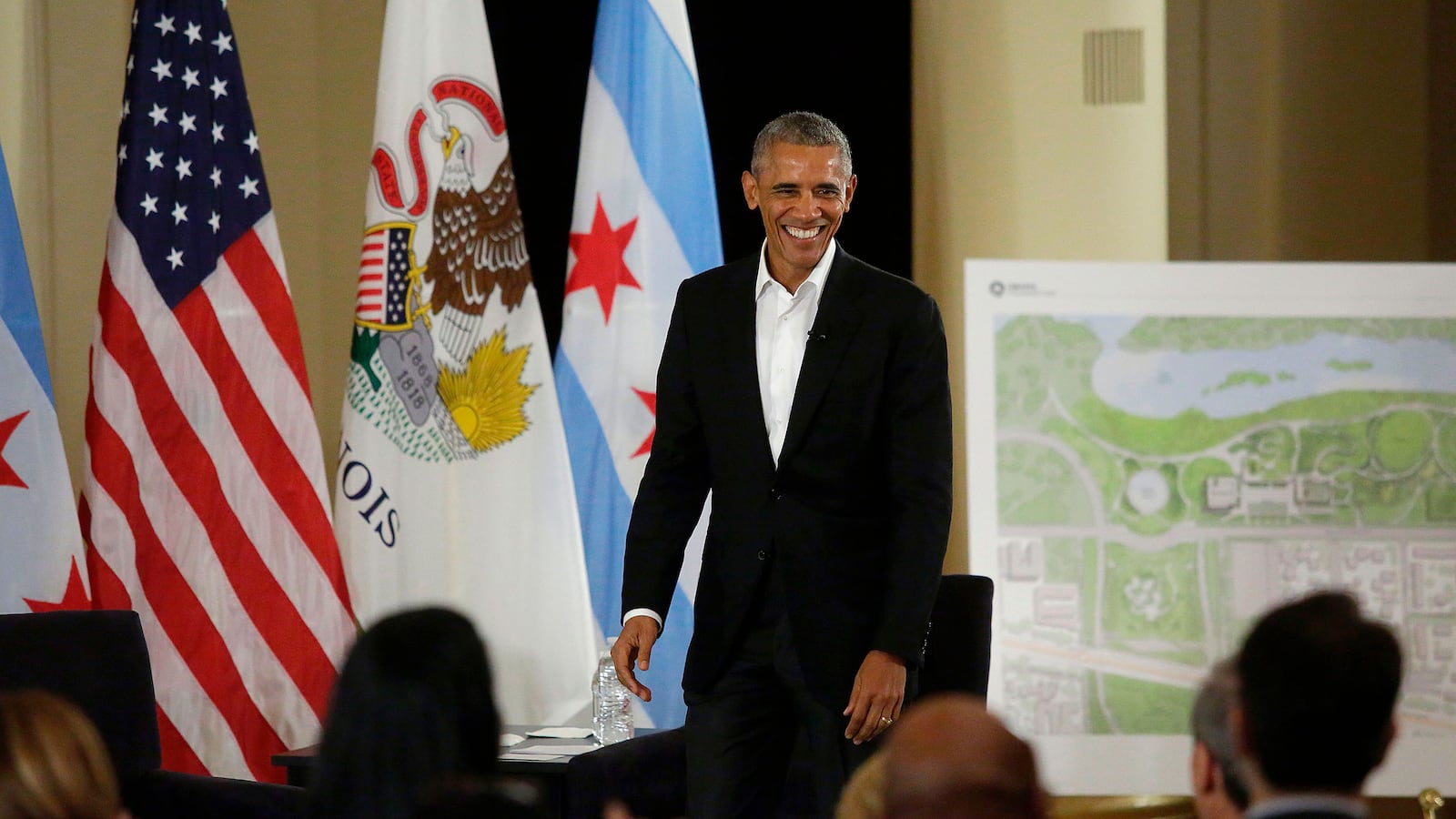At a public ceremony on July 24, 1939, Franklin Roosevelt pretended to deed a portion of his estate in Hyde Park, New York, to the United States government. FDR had to pretend because his mother, Sara Roosevelt, who held the land, didn’t agree with her son’s plan to build his presidential library there, and slipped off to Europe without signing the deed. FDR hurried a copy to her in France, which her son finally convinced her to sign, although with misgivings.
Eight decades later, we’re still arguing over the where, and the what, of presidential libraries. The latest dispute is over Barack and Michelle Obama’s decision not to build a traditional presidential library—which brings a few benefits, and many downsides, for the American public.
Traditionally, a president would build a library-museum and turn it over to the federal government to operate. For many years, that worked: the government received a free building, scholars had quick access to opened records, and former presidents and their boosters enjoyed the acclaim their self-written biographical exhibits provided.
That all changed during the '70s when, with costs ballooning and Richard Nixon threatening to destroy key presidential materials, Congress tried to seize the disgraced president’s records and tapes and change the laws to make future records subject to the Freedom of Information Act. It continued into the '80s when lawmakers worked to rein in cost of these enormous structures by limiting their size and requiring operation and maintenance endowments.
But the changes backfired. Instead of speeding access to new presidential records, the law ground it to a halt, as archivists must first review every one of the tens of millions of pages of records. Presidents found creative ways to get around the new building limits, erecting massive taxpayer-funded structures all while tightly controlling access to the public history in their museums and the private history in their archives.
And now, if the Obamas get their way, all that will change again. For the worse.
Well, mostly for the worse.
Rejecting the model that FDR crafted, and which his 11 successors (and immediate predecessor) followed, the Obamas are trying to build a new kind of institution: the Obama Presidential Center, in Chicago. They’re running into opposition from many corners. Local activists have sought to delay the project until the Obama Foundation signs a community benefits agreement, which would require the foundation to pay for affordable housing, job guarantees, rental assistance, partnerships with public schools— exactly the kind of programs that community organizer, candidate, and President Barack Obama championed.
Mr. Obama and his foundation have flatly rejected calls for the CBA, touting the supposed economic benefits they claim his center will inherently provide for the neighborhood and the city. Further complicating his plans, though, is the fact that both candidates who reached a runoff in Chicago’s mayoral election this week back the CBA.
It gets worse for Obama. Environmentalists and historic preservationists are trying to block the Obama Foundation from constructing the 200,000+ square-foot facility on 20 acres in historic Jackson Park. Opponents say that Chicago officials had pitched what would have otherwise been an illegal land grab as proper and necessary to secure what they then called the “Obama Library.” Now, those fighting against a private organization using the park for what is now called the “Obama Center” see a chance to block it.

In a lawsuit they filed in US District Court, the environmentalists claim the foundation and the city of Chicago told the public that the land would be used for an official, federal government-run presidential library, and then, after the land was transferred, backed out of doing just that. Last week, the judge in the case ruled that the group that filed the suit, Protect Our Parks, has standing to proceed.
Further contributing to the Obamas’ woes has been the awful, piecemeal, and still-incomplete rollout of the plan by the foundation and the National Archives and Records Administration, the federal agency charged with preserving and making available presidential records, to handle Obama’s records. Under the plan, the Obamas will not build and donate to the government what would have been the 14th presidential archival facility, and the National Archives will not make the Obama paper records available for public review. Instead, the foundation will select and pay a private vendor to digitize the records—helping to decide the order in which those records are scanned—and NARA will make them available online. Such a decision has alienated many, most prominently the professionals who have been presidential libraries’ most vocal supporters and patrons: journalists, historians, and archivists.
Last week, a New York Times article contributed to the confusion. Readers were alarmed at the possibility that NARA would simply dump 30 million pages of digitized records on a website and let the public find what it could among the bits and bytes, offering no on-site archivists, who, over time, have developed expertise in the records, to consult with researchers. The Times reporter resorted to a Twitter thread to try to clear up misunderstandings created by the article. But historians also took to Twitter to express their grave concerns and seek answers to many questions, including where the Obama records would be held, why researchers wouldn’t have access to the physical records, and how his classified records would be handled.
What’s clear is that, from the start, both the foundation and NARA have botched their public engagement about the Obama Presidential Center. Even clearer is that the presidential library system is broken well beyond the current controversies happening in Chicago.
Scholars who have researched at the earlier libraries think fondly and protectively of the old system; of a time when academics and nonpartisan archival professionals led the National Archives as an independent agency; of having instant access to vast quantities of available records that a cadre of professional archivists originally reviewed, processed, and cared for, and who, by and large, remained at one presidential library, developing great expertise and helping generations of researchers find precisely what they needed.
That era is over.
New archivists do not remain with one collection for most of their careers. Requests for presidential records from Ronald Reagan are stuck in years-long backlogs, with access slowed to a crawl. Leadership at the National Archives is firmly controlled by the private foundations that build presidential libraries. Those foundations even select the federal employees who run the libraries, and don’t prize nonpartisan academic achievement when making those selections.
Not one of the 13 federal presidential libraries that NARA operates has released all of its records to the public. The Reagan Library, which has been legally allowed to fulfill records requests from the public for a quarter-century, has not even released half of its records.
While the agency’s defenders claim budget woes as the reason, NARA continues to employ too many curators, exhibit specialists and technicians, educators, marketers, public affairs and communications specialists, and others who work together with the foundations to promote the presidents’ public legacies. These are all full-time government salaries that could be better spent employing archivists and fulfilling NARA’s core mission.
But where NARA spends its appropriation is only part of the problem. The agency is also failing to properly process presidential records.
An audit released two months ago by the NARA Office of Inspector General found the agency’s processing program “is not administered consistently and effectively” and contains “multiple internal control weaknesses.” In addition, the OIG reported experiencing a shocking level of delay and lack of cooperation from staff at the presidential libraries.
The arrangement between the Obama Foundation and the National Archives must be viewed in light of these troubling facts.
To be sure, that a federal agency will not legitimize and will not use taxpayer dollars to operate and maintain the Obama Presidential Museum is a good thing. The government should not be in the business (quite literally) of supporting and enabling a private partisan organization to promote past—and future—political candidates and platforms.
But the fact that there will be no public facility to house and serve the Obama presidential records; that a private political organization is controlling the digitization of official presidential records; that NARA’s attempts to build a large-scale Electronic Records Archives, at more than half a billion dollars, have failed; and that the agency that can’t create a stable, working process will be the one to review and release these records is all very bad indeed.
In 2015, I wrote an open letter to President Obama, urging him to understand the effect that well-designed online access to his documents and electronic records could have to the worlds of education, journalism, and history.
Given what we know about NARA, it appears impossible that we will see such a digital library, much less that the records alone will have this kind of effect.
In a few years, the Obamas will host an enormous celebration to open their presidential center: one without presidential records, federal archivists, or by that point, online access to even a fraction of the digitized and born-digital records that document his presidency.
This lost opportunity is the saddest part of the story. Along with the lack of transparency, the secrecy, the short-of-the mark policies, the hesitancy to act decisively, the waste of government resources in pursuit of personal acclaim, and the abandonment of some of the very groups who supported him the most.







